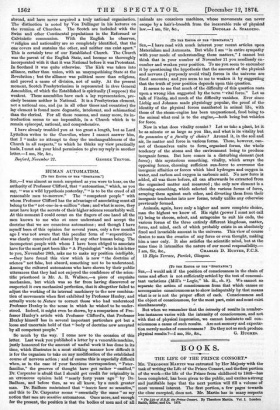[TO TEE EDITOR OF THE "SPECTATOR."] SIR,—I have read with
much interest your recent articles upon Materialism and Automata. But while I am "in entire sympathy with your mode of understanding these matters," I cannot but think that in your number of November 21 you needlessly en- cumber and weaken your position. To me you seem to encumber- it by questioning the hypothesis that the amounts of the physical and nervous (I purposely avoid vital) forces in the universe are fixed amounts ; and you seem to me to weaken it by suggesting that the truth of your position depends upon this question.
It seems to me that much of the difficulty of this question rests- upon a wrong idea suggested by the term vital force." Let us- talk of Vitality, and much of the difficulty vanishes. Ever since Liebig and Johnson made physiology popular, the proof of the- identity of the physical forces manifested in animal life, with those of the steam-engine has been unquestioned, food being to- the animal what coal is to the engine,—both being but vehicles. for force.
Now in what does vitality consist ? Let us take a plant, let it be as minute or as large as you like, and what is its vitality but the possession of a faculty of choice? Around it, in the soil and. air, lie matter and force in various forms. These, however, can- not of themselves unite to form, organised forms, the whole tendency of the atoms and the environment being to produce inorganic forms. But here comes in a disturbing element (not force) ; this mysterious something, vitality, which arrays the opposing forces, choosing sufficient sun-force to overcome the- inorganic affinities or forces which bind hydrogen and oxygen in water, and carbon and oxygen in carbonic acid. No new force is added, all was there before, all can afterwards be extracted from the organised matter and measured ; the only new element is a choosing-something, which selected the various forms of force, arraying them against each other, and diverting them from their inorganic tendencies into new forms, totally unlike any otherwise previously formed.
Animals, again, have only a higher and more complete choice,. man the highest we know of. His right (power I must not call it) being to choose, select, and antagonise to suit his ends, the- various forms of the three entirely different kingdoms, matter, force, and mind, each of which probably exists in an absolutely fixed and invariable amount in the universe. This view of course denies to man the creation of any force or even thought, making him a user only. It also satisfies the scientific mind, but at the same time it intensifies the nature of our moral responsibility.— I am, Sir, &c.,






































 Previous page
Previous page